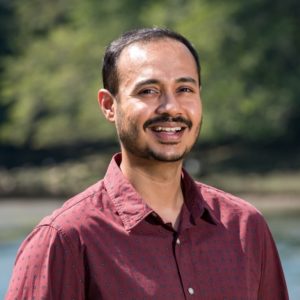 Arjun Venkatesan is an incoming Associate Professor of Civil & Environmental engineering at New Jersey Institute of Technology (NJIT). Venkatesan comes to NJIT from Stony Brook University, where he is the Associate Director of the New York State Center for Clean Water Technology and holds a joint appointment in Civil Engineering and the School of Marine and Atmospheric Sciences as a Research Associate Professor. His research focuses on the occurrence, fate and treatment of toxic chemicals in the environment, with a current focus on PFAS and 1,4-dioxane. Much of his group’s efforts have been focused on physical and chemical treatment of water and in the development of innovative analytical approaches to detect and characterize trace organics in the environment. To date, Dr. Venkatesan has published 50 plus peer-reviewed journal articles on emerging contaminants, wastewater-based epidemiology, and water treatment. His work has been featured in media, including National Geographic, PBS programming and the National Institutes of Health, among others.
Arjun Venkatesan is an incoming Associate Professor of Civil & Environmental engineering at New Jersey Institute of Technology (NJIT). Venkatesan comes to NJIT from Stony Brook University, where he is the Associate Director of the New York State Center for Clean Water Technology and holds a joint appointment in Civil Engineering and the School of Marine and Atmospheric Sciences as a Research Associate Professor. His research focuses on the occurrence, fate and treatment of toxic chemicals in the environment, with a current focus on PFAS and 1,4-dioxane. Much of his group’s efforts have been focused on physical and chemical treatment of water and in the development of innovative analytical approaches to detect and characterize trace organics in the environment. To date, Dr. Venkatesan has published 50 plus peer-reviewed journal articles on emerging contaminants, wastewater-based epidemiology, and water treatment. His work has been featured in media, including National Geographic, PBS programming and the National Institutes of Health, among others.
Read Arjun Venkatesan ’s Emerging Investigator article “Low doses of electron beam irradiation effectively degrade 1,4-dioxane in water within a few seconds” and read more about him in the interview below:
Your recent Emerging Investigator Series paper focuses on Low doses of electron beam irradiation effectively degrade 1,4-dioxane in water within a few seconds. How has your research evolved from your first article to this most recent article?
My very first article was from my master’s research which focused on the bio-regeneration of perchlorate-laden ion-exchange resin using perchlorate-reducing bacteria. Since then I have explored different aspects of water quality and treatment, with a focus on contaminants of emerging concern. During my PhD, I was trained in environmental analytical chemistry to develop sensitive and robust methods to detect trace organic contaminants with the goal of elucidating their fate and transport in the natural and built environment. My postdoctoral research expanded my understanding and applications in nano-analytics, nano-enabled water treatment, and nanotoxicity. With my training and experience in environmental analytical chemistry and physical/chemical treatment processes, I have now started exploring interfacial adsorption and radical chemistry to develop and apply innovative treatment processes to remove persistent chemicals like 1,4-dioxane and PFAS.
What aspect of your work are you most excited about at the moment?
Being in academia, what excites me most is the part where you are continuously learning. I enjoy learning and collaborating with people outside my areas of expertise as it allows me to see different perspectives to the same problem.
In your opinion, what are the most important questions to be asked/answered in this field of research?
Although my research is focused on the treatment of individual/specific groups of chemicals (1,4-dioxane, PFAS), I always wonder what else could be in our waters. There are hundreds of thousands of chemicals used in commerce, so it is impossible to know their occurrence, exposures, and associated health impacts. In my opinion, some important questions to be answered are: how do we track and assess exposures to chemical mixtures and determine the resulting health effects? How do we regulate toxic chemical mixtures? How do we account for the known “unknowns” and unknown “unknowns”?
What do you find most challenging about your research?
Time management is challenging, especially trying to balance work and family time is difficult and I am learning to get better at it.
In which upcoming conferences or events may our readers meet you?
I will be participating at ACS, AEESP, and SERDP/ESTCP conferences.
How do you spend your spare time?
Spending time with my daughter, running, and gym.
Which profession would you choose if you were not a scientist?
I am into sketching and painting. I would say: a graphic designer and would have loved a career with Pixar!
Can you share one piece of career-related advice or wisdom with other early career scientists?
The best advice that I received was not to worry about things that are not under your control. I still follow it or at least try to. And for the things under your control, you act on it now and don’t procrastinate. Following these two simple pieces of advice has made my life less complicated.










